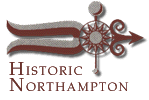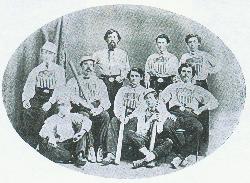

|


Northampton Baseball II: 1865-67- The Florence Eagles

In 1865, as the Civil War drew to a close, the Army of the Potomac had its own championship team composed mainly of youths from Western Massachusetts. One of the team's members wrote to a friend in Florence suggesting that when they returned home they could play a local team. Almost immediately, young men from several area teams joined the Florence Eagles: Luther B. Askin, Henry H. Bond, Edward S. Bottum, Fred W. Clark, Edmund Connell, Michael H. Dunn, Edward H. Hammond, Arthur G. Hill, Philip J. Mara, John McGrath, James Mehan, John B. O'Donnell, Jonas Polmatier, Andrew Robertson, and Patrick Whalen.
The Eagles met the team of returned veterans on August 1, 1865, and as the Courier reported, "To the surprise of nearly everyone, the Eagle was victorious." This led to several baseball games throughout the rest of the summer--against teams from Conway, Amherst College, Easthampton, and Haydenville--all of which the Eagles won.
Over the winter of '65-'66, the Eagles attracted as many as 100 members. With so many supporters, the Eagles could afford to challenge clubs from outside the area. They could also afford spiffy uniforms made by the Florence Sewing Machine Company. That April they started out again by defeating teams from Conway, Amherst College, and Holyoke. On June 9, 1866, the Eagles suffered their first defeat at the hands of the Hampden Club from Chicopee, at that time the possessor of the silver baseball signifying the championship of Western Massachusetts.
The Eagles reorganized and challenged the Chicopee team to another match and defeated them on August 18. The Eagles continued to hold the silver ball until they met the Chicopee team for a third time on October 6. During the game, the Eagles came to suspect that the ball provided by the Chicopee team was lighter than the regulation ball and they protested; ordered to continue playing, they did--and lost. After the game the Eagles had the ball weighed and established that it was in fact lighter--and then learned that the Hampden team had deliberately been practicing with this lighter ball. The Eagles decided not to compete for the silver ball again. They did continue playing, traveling to New York to compete against the two most powerful clubs of the day, the Brooklyn Excelsiors and Brooklyn Atlantics--and not unexpectedly lost. It was no shame for the Eagles to lose to the Atlantics by five runs on November 5,1866, since the Atlantics were regarded as national champions.
In 1867 the Eagles defeated teams from all over the Northeast--Greenfield, Pittsfield, New Bedford, Meriden CT, New London CT, and elsewhere. Once again, though, they went "out of their league" and were defeated twice by another of the most powerful teams of that era, the Lansingburgh (Troy, NY) Haymakers, destined to become one of the first major league ball clubs in the National Association and National League.
Recognized as the champions of Western Massachusetts, the Eagles were invited to Boston to play against four other teams from the eastern part of the state. The Eagles advanced to the finals against the Tri-Mountain Club of Boston, but soon decided that the umpire was biased in favor of the home team and after several disputed calls forfeited the game.
The Eagles did not field a team in 1868 or thereafter. The most likely reason was that the members had grown just enough years older that they were feeling more responsibility--to their careers, their families. Two went on to become mayors of Northampton, A. G. Hill and J. B. O'Donnell. H. H. Bond administered a fund to assist local workers to purchase homes, an institution that became Florence Savings Bank.
The record of the Eagles stands: some 60 games played, of which they lost only 7, 5 of them (including the forfeit in Boston) to the strongest teams in the nation. Many other baseball teams would continue to play in Florence and Northampton, but none drew larger crowds, up to 4000 for
Contents Historic Northampton.